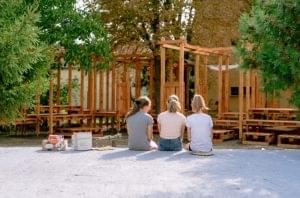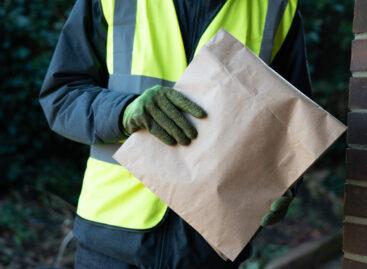The eco-classroom and community space raise environmental education to a new level
Another eco-classroom was built in Hungary. The project, which mobilized more than 100 volunteers, was realized with the support and initiative of DS Smith with the assistance of the Department of Residential Building Design of the BME.

The community space created along the principles of experiential pedagogy aims at more effective environmental education, as well as introducing the processes of the circular economy, which is considered the company’s mission.
With experiential pedagogy for an environmentally conscious generation
Experience is the key to forming an environmentally conscious attitude. The opportunity for this is created by experiential pedagogy, which leaves the framework of formal education and builds the process of knowledge transfer and skill development on impulses and stimuli. This is what DS Smith wants to support. As part of its cooperation with the Ellen MacArthur Foundation, the leading company providing sustainable packaging solutions contributed 5,000 pounds to the realization of the eco-classroom built in the yard of the Váci Mihály Catholic Primary School in Nagykáta. The aim of the project is to fill the previously little-used part of the garden with a function; in addition to the lessons, developmental sessions, environmental education and community programs should also be given space.
Community construction and architect professional support
The forward-thinking packaging company cooperated with the BME Department of Residential Building Design during the eco-classroom program. The outdoor classroom was created based on the project work of the University’s architecture students, Emese Szakál and Réka Zoboki. The structure consists of modular elements, which made it possible for it to come to life in the framework of community construction, by volunteers, and to be further expanded in the future. The central element of the construction named Cifra Palace is the community itself, and the whole concept was built around it. The experts assessed the needs of students, teachers and parents in workshops during the various phases of the design, which highlighted that the special outdoor structure will play a particularly important role in the life of the school community. Thus, in addition to being used as a classroom, it is important for them that it functions as a social space during breaks and leisure activities, and provides a private sphere, if necessary, a kind of study nook. The eco-classroom is closely connected both physically and in its spiritual message to the school garden established a few years ago on the side of the school, which is also very popular among students. More than 100 volunteers supported the construction of the outdoor room accommodating two classes, teachers, students, parents, former students of the school and company employees all took part in the work. According to university associate professor László Vincze, the consultant of the design couple, it is especially valuable if the students can complete a project in which they can experience the difference between a building created by a community and a building that is not connected to the people who live in it or the users. After all, through the involvement of the community, a given place will have a history at the moment of its construction.
“We are always happy to join projects in which there is a real emphasis on teamwork and the involvement of later users in both planning and execution,” added university assistant professor Zsófia Dankó, project leader on behalf of the BME Department of Residential Building Design. DS Smith works and develops its products according to the criteria of the circular economy, part of which is the conscious choice of raw materials. Thus, what it is made of was also a key aspect during the design of the eco-classroom. To create the structure consisting of pallets and wooden pillars, the design couple was inspired by examples from Spain and the Azores.
“Cifra Palace, its windows are green”
The Cifra palato eco-classroom in Nagykáta is not alone, because it has a brother. Another school eco-space was handed over a year ago, the experience of which provided a good basis for the continuation. The example of Pais Dezső Primary School in Békásmegyer confirmed how important it is for children to get close to nature and to absorb the essence of environmentally conscious thinking through their own experiences, and for this, such spaces are needed. Moreover, outdoor activities not only draw attention to the importance and learning of a sustainable, green lifestyle, but also provide opportunities for children with passive or special educational needs to develop and achieve success. It is no coincidence that experience-based methods are also called success-based methods, which can also be used to develop general skills such as attention concentration, logical thinking, grasping the essence, and they also help in the imprinting of various knowledge materials, as they combine the knowledge materials of several subjects in a complex way.
“The success of the eco-classroom built in Budapest was clear to all parties involved. As a result, we decided that we would like to continue this initiative in the future, thus supporting the cities and communities that host our locations. We must strive to create educational frameworks and forms that meet the needs of our children, as we must give them all the help we can to promote them in creating a sustainable life in harmony with nature,” said Zsolt Fekete, DS Smith’s Hungarian and sub-regional managing director.
Related news
Bags are flooding in: 22 billion plastic packaging could go out of fashion by 2030
The cost of online clothes is not only a burden…
Read more >NAV: Redemption fee is not taxable for private individuals
The National Tax and Customs Administration (NAV) has issued a…
Read more >DS Smith opens new eco-classroom in Füzesabony
For the third time this year, DS Smith opened an…
Read more >Related news
GKI analysis: Why do Hungarian households live more poorly than anyone else in the EU?
Imagine that the residents of every EU country shop in…
Read more >KSH: industrial producer prices decreased by 0.7 percent in May 2025 compared to the previous month, and increased by an average of 6.9 percent compared to a year earlier
In May 2025, industrial producer prices were 6.9 percent higher…
Read more >Consumption drives the economy
According to the latest forecast by the Balance Institute, the…
Read more >






